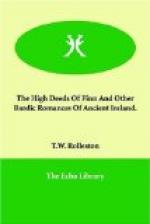[26] Woad is a cruciferous plant,
Isatis tinctoria, used for
dyeing.
So Cormac, son of Art, ruled in Tara and was High King of all Ireland. And the land, it is said, knew its rightful lord, and yielded harvests such as never were known, while the forest trees dripped with the abundance of honey and the lakes and rivers were alive with fish. So much game was there, too, that the folk could have lived on that alone and never put a ploughshare in the soil. In Cormac’s time the autumn was not vexed with rain, nor the spring with icy winds, nor the summer with parching heat, nor the winter with whelming snows. His rule in Erinn, it is said, was like a wand of gold laid on a dish of silver.
Also he rebuilt the ramparts of Tara and made it strong, and he enlarged the great banqueting hall and made pillars of cedar in it ornamented with plates of bronze, and painted its lime-white walls in patterns of red and blue. Palaces for the women he also made there, and store-houses, and halls for the fighting men—never was Tara so populous or so glorious before or since. And for his wisdom and righteousness knowledge was given to him that none other in Ireland had as yet, for it was revealed to him that the Immortal Ones whom the Gael worshipped were but the names of One whom none can name, and that his message should ere long come to Ireland from over the eastern sea, calling the people to a sweeter and diviner faith.
And to the end of his life it was his way to have wolves about him, for he knew their speech and they his, and they were friendly and tame with him and his folk, since they were foster-brothers together in the wild wood.
III
THE MARRIAGE OF KING CORMAC
It happened that in Cormac’s time there was a very wealthy farmer named Buicad[27] who dwelt in Leinster, and had vast herds of cattle and sheep and horses. This Buicad and his wife had no children, but they adopted a foster-child named Ethne, daughter of one Dunlang. Now Buicad was the most hospitable of men, and never refused aught to anyone, but he kept open house for all the nobles of Leinster who came with their following and feasted there as they would, day after day; and if any man fancied any of the cattle or other goods of Buicad, he might take them home with him, and none said him nay. Thus Buicad lived in great splendour, and his Dun was ever full to profusion with store of food and clothing and rich weapons, until in time it was all wasted away in boundless hospitality and generosity, and so many had had a share in his goods that they could never be recovered nor could it be said of any man that he was the cause of Buicad’s undoing. But undone he was at last, and when there remained to him but one bull and seven cows he departed by night with his wife and Ethne from Dun Buicad, leaving his mansion desolate. And he travelled till he came to a place where there was a grove of oak trees by a little stream in the county of Meath, near where Cormac had a summer palace, and there he built himself a little hut and tended his few cattle, and Ethne waited as a maid-servant upon him and his wife.




